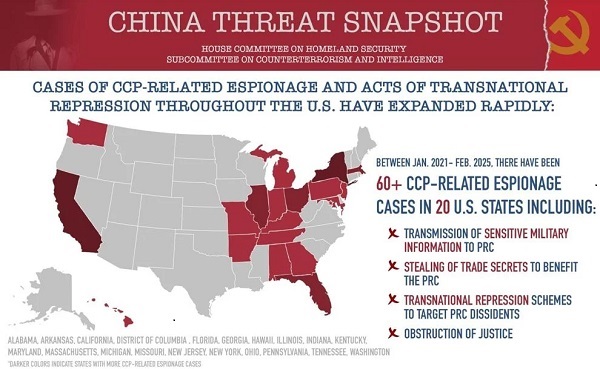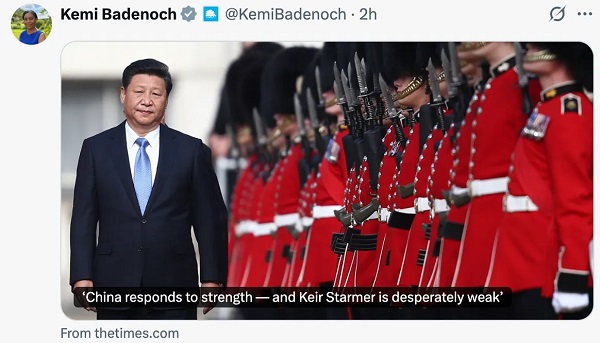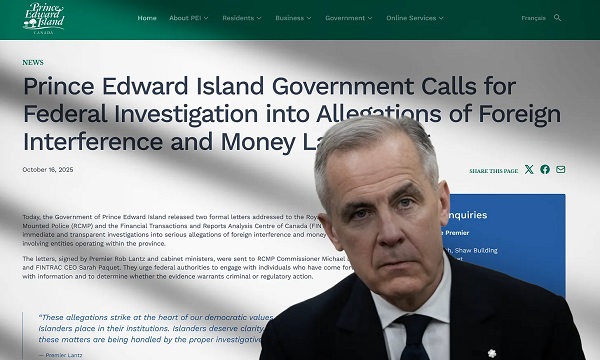espionage
Bill introduced to ban student visas to Chinese nationals

From The Center Square
By
U.S. Rep. Riley Moore, R-WV, filed a bill on Friday to ban Chinese nationals from receiving student visas.
“Every year we allow nearly 300,000 Chinese nationals to come to the U.S. on student visas. We’ve literally invited the CCP to spy on our military, steal our intellectual property, and threaten national security. Just last year, the FBI charged five Chinese nationals here on student visas after they were caught photographing joint US-Taiwan live fire military exercises. This cannot continue,” he said.
Moore’s Stop Chinese Communist Prying by Vindicating Intellectual Safeguards in Academia Act (Stop CCP VISAs Act) has several cosponsors. The bill would amend the Immigration and Nationality Act to prohibit the admission of Chinese nationals as nonimmigrant students, according to the bill language.
He points to the FBI last year charging five Chinese nationals who were in the U.S. on student visas at the University of Michigan after they were caught photographing joint US-Taiwan live fire military exercises at Camp Grayling in August 2023 claiming they were members of the media.
He also points to a Chinese student attending the University of Minnesota who was sentenced to six months in prison last October for taking drone photographs of naval shipbuilding operations at Newport News Shipbuilding in Norfolk, Virginia. Moore also points to a former Illinois Institute of Technology graduate who was sentenced to eight years in prison in 2023 for spying for the Chinese government, acting as an agent of China’s Ministry of State Security and making a material false statement to the U.S. Army when he enlisted in the U.S. Army Reserve.
“Congress needs to end China’s exploitation of our student visa program. It’s time we turn off the spigot and immediately ban all student visas going to Chinese nationals,” he said.
These are but a handful of examples. More than 60 Chinese Communist Party-related cases of espionage and acts of transnational repression were reported in 20 states under the Biden administration, according to a U.S. House Committee on Homeland Security report, The Center Square reported. That’s in addition to 224 reported incidents of Chinese espionage directed at the U.S. between 2000 and 2023, according to the report. Examples include transmission of sensitive military information to the People’s Republic of China (PRC), theft of U.S. trade secrets to benefit the PRC, transnational repression schemes to target PRC dissidents and obstruction of justice.
Other examples include a Department of Justice case from last December involving a Chinese national and lawful permanent resident of California who was arrested for flying a drone over Vandenberg Space Force Base and taking photographs. He was arrested for violating national defense airspace prior to boarding a flight to China.
Another DOJ case related to a Chinese national illegally living in the U.S. who was arrested for allegedly shipping weapons and ammunition to North Korea, The Center Square reported.
Another involved a PRC spy arrested in California who worked for a state lawmaker and Chinese operatives arrested in Guam near a U.S. military installation on the same day as a live ballistic missile interception test, The Center Square reported.
Outgoing FBI Director Christopher Wray’s parting warning to Americans was that China remains one of the greatest threats to U.S. national security, a warning he consistently issued.
“The greatest long-term threat facing our country, in my view, is represented by the People’s Republic of China, the Chinese government, which I consider to be the defining threat of our generation,” he said, The Center Square reported.
The DOJ says it opens new cases to counter PRC intelligence operations roughly every 12 hours. Of the espionage cases it’s prosecuted since 2018, it says 80% allege the PRC would benefit; 60% of trade secret theft cases are linked to China.
It also lists examples of indictments of Chinese nationals conspiring to and committing economic espionage and theft of trade secrets going back to 2018 under the Trump administration.
PRC threats increased as the greatest number of Chinese nationals illegally entered the U.S. in recorded history under the Biden administration – more than 176,000 nationwide, The Center Square first reported.
espionage
“Suitcase of Cash” and Secret Meeting Deepen Britain’s Beijing Espionage Crisis

Britain’s most consequential espionage scandal in a generation has narrowed on Keir Starmer’s inner cabinet after The Sunday Times revealed that alleged Chinese agent Christopher Berry was intercepted at Heathrow Airport with a “suitcase full of cash” — and that senior officials, including National Security Adviser Jonathan Powell and Cabinet Secretary Christopher Wormald, held a closed-door meeting, allegedly discussing that advancing the case would harm relations with Beijing, weeks before prosecutors abandoned the insider-threat file.
The revelations, combined with an explosive Opposition letter from Kemi Badenoch and a rare diplomatic intervention from Washington, have plunged Prime Minister Keir Starmer’s government into the most serious national-security controversy of its tenure — one now shaking both Westminster and the Five Eyes intelligence alliance. Not since the Kim Philby affair and the exposure of the Cambridge Spy Ring has a British government been so roiled by allegations of insider compromise and appeasement toward a hostile foreign state.
As The Sunday Times reported, Christopher Berry — a 33-year-old academic from Oxfordshire — was stopped under the Terrorism and Border Security Act after a February 2023 flight from China. Police seized £4,000 in cash, believed to have been supplied by his Chinese handler, codenamed “Alex,” linked to the Ministry of State Security.
A witness statement tabled in Parliament last week indicated that Berry funnelled real-time political intelligence through his MSS handler to one of Beijing’s senior leaders, all collected from a former Chinese teaching colleague — a Parliamentary researcher with deep access to senior Conservative MPs. Beijing reportedly viewed those MPs as a strategic threat, fearing that if they rose to higher office they would adopt a far stricter stance toward China’s geopolitical ambitions.
Though Berry was not detained at the time, the incident became central to the espionage case later dropped by the Crown Prosecution Service when the Starmer government declined to certify that China posed an “ongoing threat to national security” — a legal requirement under the Official Secrets Act.
The Sunday Times also revealed that Deputy National Security Adviser Matthew Collins, the government’s sole witness, privately acknowledged that the decision not to describe China as an “ongoing threat” was “political.” The paper further disclosed that Jonathan Powell — a former banking executive who rose to become Starmer’s National Security Adviser — chaired a meeting on September 1 attended by Cabinet Secretary Christopher Wormald and MI5 Director-General Sir Ken McCallum, in which “the general theme of discussion was how the UK’s relationship with China was going to be damaged by this case.”
If accurate, that account directly contradicts Starmer’s assurance to Parliament that “no minister or special adviser was involved.” The implication — that Britain’s most senior national-security officials were weighing diplomatic consequences while an active espionage prosecution was still underway — has intensified accusations that the case was derailed by political interference rather than evidentiary weakness.
Within hours of the Sunday Times story, Opposition Leader Kemi Badenoch posted a letter to X accusing Keir Starmer of misleading Parliament and concealing ministerial involvement in the case’s collapse.
Framing the letter, Badenoch sought to explain the rapidly evolving affair to a wider audience. “I don’t blame you if you’ve struggled to follow the China spying case engulfing Parliament. Even MPs are finding it hard to keep up with a story that seems to change by the hour,” she wrote. “I suspect many fair-minded people have assumed this story can’t contain much. It seems too implausible for the government to have deliberately let off people who were accused of spying on MPs. But the story is truly astonishing. The layers of it have unravelled over the past few weeks like something from a spy novel.”
In the letter itself, Badenoch demands full disclosure of all correspondence, meetings, and witness-statement revisions involving Jonathan Powell, the Attorney General, or the Cabinet Office. She references the Sunday Times account directly, noting that “Powell left attendees with the understanding that Deputy National Security Adviser Collins’s witness statement would operate within the language of the report,” implying foreknowledge and coordination between Downing Street and prosecutors. She further alleges that Starmer’s ministers “softened” later witness statements to downplay Chinese espionage, replacing hard intelligence assessments with diplomatic phrasing designed to reassure Beijing. Her conclusion is cutting: “You have shown Britain is weak in the face of espionage, and have emboldened our enemies to believe they can spy on us with impunity.”
As reported previously by The Bureau, the controversy has now drawn international concern. The Chair of the U.S. House Select Committee on the Chinese Communist Party, John Moolenaar, has issued an extraordinary public rebuke on the court matter — a move almost without precedent between close allies. In a two-page letter dated October 16, 2025, addressed to James Roscoe, chargé d’affaires at the British Embassy in Washington, Moolenaar warned that Britain’s decision to abandon the prosecution risked setting “a dangerous precedent that foreign adversaries can target democratically elected legislators with impunity.” He wrote that the decision “deeply troubles” U.S. lawmakers and “undermines Five Eyes security coordination,” given the substantial amount of evidence against Berry and Christopher Cash, who were accused of funnelling parliamentary intelligence to the Chinese Communist Party.
“I hope the UK government will not allow this case to falter,” Moolenaar said, “and will instead take the steps necessary to ensure that both justice and due process are served.”
The letter, co-signed by senior members of the Committee and publicly released by Congress, marks an exceptional public intervention in a live national-security case involving a Five Eyes partner. Moolenaar added that the decision to drop the prosecution — despite evidence confirming a direct intelligence channel from Westminster to Beijing — “paints a concerning picture,” noting the resumption of high-level UK–China trade talks, negotiations over China’s proposed “super embassy” in London, and London’s ongoing review of its diplomatic posture toward Beijing. “Allowing this PRC aggression to go unchecked,” he warned, “would only incentivize the CCP to further interfere in Western democracies.”
As The Bureau previously detailed, Matthew Collins’s witness statement traced an intelligence pipeline connecting Westminster directly to Beijing’s leadership. Berry, via his handler “Alex,” transmitted reports obtained from Christopher Cash, a parliamentary aide with access to Conservative MPs critical of Beijing. Collins confirmed that some of the same intelligence later appeared in the possession of a senior CCP Politburo Standing Committee member — reportedly Cai Qi, one of Xi Jinping’s closest allies. Collins also documented Beijing’s targeted inquiries into the 2022 Conservative leadership race, focusing on Tom Tugendhat and Neil O’Brien, both members of the China Research Group (CRG) and long-standing critics of the CCP.
Taken together, the Heathrow cash seizure, the Powell-chaired meeting, the Badenoch letter, and the U.S. congressional intervention point to a modern Cold War crisis — a confrontation that has now moved beyond Westminster to test the cohesion of the Western alliance itself.
The Bureau is a reader-supported publication.
To receive new posts and support my work, consider becoming a free or paid subscriber.
espionage
PEI to Ottawa: Investigate CCP Footprints—Now

A tiny province just did what the federal government refuses to: demand answers about foreign interference and Chinese money.
Prince Edward Island’s new government just lit a signal fire Ottawa can’t ignore—two formal letters demanding immediate, transparent federal investigations into alleged foreign interference and money laundering on the Island. One to RCMP Commissioner Michael Duheme, the other to FINTRAC CEO Sarah Paquet. Clear, direct, no hedging: talk to the whistleblowers, follow the money, and determine whether criminal or regulatory action is warranted.
And here’s the part that should make every sane person furious: why did it take a new government to do the obvious? Where was this urgency from the last crew running Charlottetown? For years, Islanders were told to calm down, look away, don’t ask questions—and now, in week one of grown-up supervision, we suddenly discover the tools were always there. Why didn’t the previous government pull them?
Even worse, why hasn’t the Liberal establishment in Ottawa barley lifted a finger in regards to foreign interference in this country? This is the same crowd that held a public inquiry into foreign interference, took victory laps, and then… parked the file. The commission issued volumes of findings and 50-plus recommendations, but action? Mostly press releases. Meanwhile, the much-hyped foreign influence registry —passed on paper in 2024— still isn’t fully in force, with cabinet dithering while everyone pretends it’s complicated. If the smallest province can move in days, what’s Ottawa’s excuse after years of warnings and a law they already passed?
Premier Rob Lantz framed it plainly: Islanders deserve clarity and competent, depoliticized scrutiny. The province says the move follows years of speculation and a Parliament Hill press conference on Oct. 8 where a former RCMP superintendent suggested evidence could justify a criminal probe centered on PEI. Translation: this is no longer a fringe concern—it’s now an official paper trail with the RCMP and FINTRAC on the hook.
PEI also reminded Ottawa that in February 2025 it ordered the Island Regulatory and Appeals Commission (IRAC) to run an independent land-ownership investigation—with new powers added to the Lands Protection Act in 2022—amid public questions about complex land purchases and potential indirect control. That review is ongoing and now sits alongside the requested federal probes.
Context matters: investigative reporting in recent weeks connected these concerns to Buddhist-affiliated networks and called for a wider federal inquiry. Whether every allegation holds or not, PEI’s letters escalate the file from media claims to formal federal scrutiny—exactly where it belongs if Canada is serious about foreign interference.
Bottom line: a tiny province—Prince Edward Island of all places—just forced a national reckoning. Not Toronto, not Ottawa, not some vaunted federal intelligence agency. No, it took 160,000 salt-of-the-earth Islanders to do what the entire Liberal Party has refused to do for years: demand an investigation into what looks suspiciously like CCP-linked land grabs, money laundering, and political influence operations happening right under our noses.
And yet—silence from Ottawa. Why? Because could it be that the same people now running the show in this country are the ones who spent the last decade cheerleading for the Chinese Communist Party? Mark Carney, has a track record with China that reads like a LinkedIn endorsement from the People’s Liberation Army. Brookfield, where Carney was Vice Chair, took $250 million from the Bank of China to fund its real estate empire. You think that doesn’t come with strings? Please.
And Trudeau? Let’s not forget, this is the man who once said he admired China’s “basic dictatorship”—because, of course he did. That kind of centralized control makes things so efficient when you’re trying to crush dissent and funnel wealth into the hands of a compliant elite.
The ball is in the RCMP and FINTRAC’s court. But if you’re expecting urgency from institutions shackled to the same political class that let this rot take hold, don’t hold your breath. PEI just did the hard part. Now we get to find out if Canada has any real institutions left.
Subscribe to The Opposition with Dan Knight
-

 MAiD13 hours ago
MAiD13 hours agoDisabled Canadians increasingly under pressure to opt for euthanasia during routine doctor visits
-

 Alberta15 hours ago
Alberta15 hours agoPetition threatens independent school funding in Alberta
-

 Alberta2 days ago
Alberta2 days agoBusting five myths about the Alberta oil sands
-

 Courageous Discourse1 day ago
Courageous Discourse1 day agoNo Exit Wound – EITHER there was a very public “miracle” OR Charlie Kirk’s murder is not as it appears
-

 Business2 days ago
Business2 days agoQuebecers want feds to focus on illegal gun smuggling not gun confiscation
-

 Business14 hours ago
Business14 hours agoCanada Revenue Agency found a way to hit “Worse Than Rock Bottom”
-

 Energy2 days ago
Energy2 days agoMinus Forty and the Myth of Easy Energy
-

 Health2 days ago
Health2 days agoNew report warns WHO health rules erode Canada’s democracy and Charter rights





